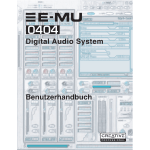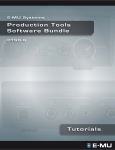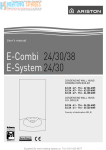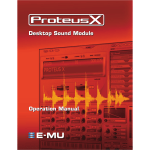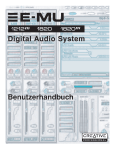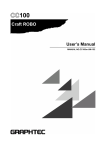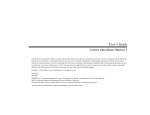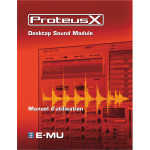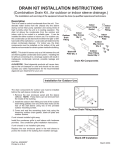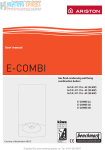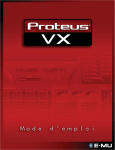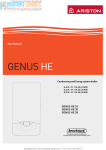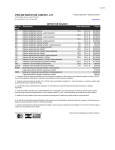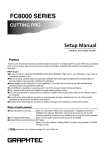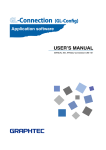Download Tutorials - Birdland Music
Transcript
E-MU Systems Production Tools Software Bundle PTSB-5 Tutorials Tutorials 1 Tutorials for E-MU Production Tools Software Bundle (PTSB-5) © 2009 E-MU Systems All Rights Reserved Revision: A E-MU World Headquarters E-MU Systems 1500 Green Hills Road Scotts Valley, CA 95066 USA Europe Creative Labs (Ireland) Ltd Ballycoolin Business Park Blanchardstown, Dublin 15 IRELAND 2 Japan Creative Media K. K. Kanda Eight Bldg., 3F 4-6-7 Soto-Kanda Chiyoda-ku, Tokyo 101-0021 JAPAN E-MU Production Tools Software Bundle TABLE OF CONTENTS Introduction .............................................................................. 5 Before you Begin... ........................................................................................5 IMPORTANT - 0404-PCIe, 1212PCIe, 1616-PCIe owners: ..................................5 Getting Started with Steinberg Cubase LE4 ................................ 6 1 - Setting up Cubase LE4 ..............................................................................6 Buffer Latency Setting ................................................................................. 7 Setting up a New Project ............................................................................ 7 Optional - Add Additional Input Busses ....................................................... 8 2 - Basic Multitrack Recording .........................................................................8 Add an Audio Track .................................................................................... 8 Get Ready To Record .................................................................................. 9 Record Another Track ............................................................................... 10 3 - Recording a MIDI Track using the Proteus VX Sound Module ...................11 Make the Connections .............................................................................. 11 Open VX & Load a Bank ........................................................................... 12 To Record a MIDI Track ............................................................................. 13 To Record a MIDI Track on another MIDI Channel ..................................... 13 Program Changes .................................................................................... 13 On Your Own ..............................................................................................13 Getting Started with Cakewalk Sonar 6 LE ............................... 14 1 - Setting up Sonar 6 LE ..............................................................................14 Run Sonar 6 LE for the first time ................................................................ 14 Set-up the Audio Options ......................................................................... 15 Return to the Audio Setup Options ........................................................... 16 Set the Location of your Audio Files .......................................................... 16 2 - Basic Multitrack Recording .......................................................................17 Record a Track .......................................................................................... 18 Create another Audio Track ...................................................................... 18 Record another Track ............................................................................... 18 Save your Project ...................................................................................... 18 3 - Recording a MIDI Track using the Proteus VX Sound Module ...................19 Select the Virtual Instrument ..................................................................... 19 The MIDI Connection ................................................................................ 20 Open Proteus VX ...................................................................................... 20 Load the Proteus X Composer Bank .......................................................... 20 Play a Few Presets .................................................................................... 21 To Record a MIDI Track ............................................................................. 21 To Record a MIDI Track on another MIDI Channel ..................................... 22 On Your Own ..............................................................................................23 Tutorials 3 Getting Started with Ableton Live Lite 6 .................................. 24 Before you Begin: ........................................................................................ 24 1 - Setting up the Preferences ...................................................................... 24 Set up the Audio Parameters .................................................................... 24 Check the MIDI Parameters ...................................................................... 25 Check the File Folder Parameters .............................................................. 25 Demo Mode ............................................................................................ 26 2 - Follow the Live 6 Lessons ........................................................................ 27 3 - Running the Proteus VX Sound Module from Ableton Live ....................... 28 Load the Proteus X Composer Bank .......................................................... 29 Change the Preset from Live ..................................................................... 30 4 - Record a MIDI Track in Live ...................................................................... 31 Get Ready to Record ................................................................................ 32 Adjust the Loop Length ............................................................................ 32 Add Another MIDI Track ........................................................................... 33 Choose a Sound for MIDI Channel 2 ........................................................ 33 Get Ready to Record on Channel 2 .......................................................... 34 Saving your Work ..................................................................................... 34 On Your Own .......................................................................................... 34 Other Cool Tips ............................................................................................ 34 4 E-MU Production Tools Software Bundle Introduction Before you Begin... TUTORIALS Introduction This guide contains step-by-step tutorials of basic recording operations using your E-MU audio interface and four of the applications in the E-MU Production Tools Software Bundle (PTSB-5). • Cubase LE4 - a 24-bit, multi-track audio/MIDI sequencer for OS X/Windows • Sonar 6 LE - a popular 24-bit multi-track audio/MIDI sequencer for Windows • Ableton Live Lite 6 - an innovative composition and live performance tool for OS X and Windows TIP . . . Additional sound banks are available for the Proteus VX software sound module. Go to E-MU Sound Central at: http://www.emu.com/ shop/ • Proteus VX - a software sound module with 1000 sounds (Windows) We highly encourage you to perform the steps on your computer so that you can “learn by doing.” The first tutorial only takes about half an hour to complete, by which time you’ll know how to make multitrack recordings and much more. NEED MORE HELP? If you need additional help with the bundled applications, please see: • Windows: Program Files\Creative Professional\ [Your E-MU Product]\Documents\3rdParty.htm. • OS X: Applications Drive\Library\Documentation\ [Your E-MU Product]\3rdParty.htm\ NOTE Proteus VX sound banks are loaded into system RAM. Some factory sound sets may be too large to fit into your available RAM. Proteus X2, Emulator X2 and Emulator X3 have vastly expanded capabilities over Proteus VX and both stream samples from your hard disk requiring far less available RAM space. Before you Begin... • You should have already installed and tested the E-MU audio interface. • You should hear the computer sounds coming out of the E-MU audio interface and your speakers when you play a CD or an MP3 using Windows Media Player or iTunes. If not, refer to the Quick Start Guide or pdf manual (located under Help in the PatchMix or USB Audio Control Panel application) to make sure that the drivers are correctly installed and that your audio interface is properly connected. If necessary, uninstall the E-MU Drivers, then reinstall following the instructions in the manual. WARNING! Windows Users After checking your audio, be sure to quit Windows Media Player. • You should have already installed Cubase LE4, Sonar LE, and Ableton Live Lite 6 E-MU Edition software on your computer. Windows users should also have the Proteus VX software sound module installed. • A source of audio should be connected to the inputs (a microphone, musical instrument, or CD/MP3 player). IMPORTANT - 0404-PCIe, 1212PCIe, 1616-PCIe owners: Select the Product Default session in PatchMix before launching any of the third party applications. This will ensure that ALL your available inputs appear in the audio applications and will avoid unnecessary confusion. To Select the Product Default Session: 1. Select New Session from the PatchMix Mixer view. 2. Select Product Default from the list of available Templates and click OK. 3. Click OK again when the Session Settings dialog box appears. 4. Close the PatchMix DSP Mixer. Tutorials 5 Getting Started with Steinberg Cubase LE4 1 - Setting up Cubase LE4 Getting Started with Steinberg Cubase LE4 (Windows, OS X) Steinberg Cubase LE 4 is a 24-bit, multi-track audio/MIDI sequencer with highquality effects, automation, virtual instruments (VSTi), and many other professional features. The following step-by-step tutorials are designed to get you recording as quickly as possible. 1 - Setting up Cubase LE4 Follow these instructions carefully to ensure that Cubase LE 4 runs smoothly the first time. Cubase LE 4 will remember these settings, so you’ll only have to do this once. 1. Open Cubase LE 4 from the Start menu. An ASIO multimedia driver test dialog box will pop up to ask if you want to run the ASIO test. Choose No, because you won’t be using the driver anyway. 2. Select New Project from the File menu. TIP . . . If you have two or more hard disks, it’s better to store audio files on a disk that isn’t running your OS. 3. Select Empty and click OK. 4. A Select Directory pop-up dialog box will appear. Choose a location on your hard disk where you want to store your audio files, then click OK. 5. The Cubase LE 4 Project window appears. 6. Select Device Setup… from the Devices menu. Step 10: VST Audio 7. Select VST Audio System from the left pane. WARNING! DO NOT select the “ASIO Multimedia Driver” or the “ASIO Direct X Full Duplex Driver.” 6 8. Select the ASIO Driver. Choose your E-MU interface from the list. Choose: E-MU ASIO (0404, 1212, 1820, 1616 Digital Audio Systems), ASIO E-MU 0404|USB, ASIO E-MU 0202|USB, or ASIO E-MU TRACKER Pre|USB. 9. A pop up dialog box asks you if you want to keep or switch the ASIO driver. Select Switch. E-MU Production Tools Software Bundle Getting Started with Steinberg Cubase LE4 1 - Setting up Cubase LE4 Buffer Latency Setting 10. Click on the name of your E-MU interface that appears immediately below VST Audio System in the Devices pane. Refer to the following screen. Step 11 Control Panel Step 10 VST Audio 11. Click the Control Panel button. The pop-up dialog box shown at right appears. 12. Set the ASIO Buffer Latency as low as your computer will allow and click OK. (10ms is a good starting point.) A low latency setting is important to assure fast response when using virtual instruments and to minimize delay when monitoring through Cubase. If you hear crackles or other audio problems, try increasing the Buffer Size. NOTE E-MU 0202 Control Panel is shown at left. The Bit Depth field does not appear with 0404PCI, 1212, 1820 or 1616. 13. Close the Device Setup screen by clicking OK. Setting up a New Project 14. Select New Project from File menu in Cubase LE 4. A pop-up Template selection dialog box appears. Select Empty, then click OK. 15. Another pop-up dialog box appears asking you to select the directory in which your audio files will be stored. Choose a location to store your audio files and click OK. 16. Select Project Setup (Shift +S) from the Project menu. This is where you set the Sample Rate and Record Format (bit depth), among other things. Set the Record Format to 24 Bit and the Sample Rate to 44.100 kHz. Tutorials NOTE If the Cubase LE 4 application crashes for any reason, it is recommended that you re-boot the computer. 7 Getting Started with Steinberg Cubase LE4 2 - Basic Multitrack Recording Optional - Add Additional Input Busses If you are using an audio interface that has more than two inputs (0404 USB, 0404, 1212, 1616, 1820), the following instructions will allow you to select these extra inputs to feed your audio tracks. 17. Select VST Connections (F4) from the Devices menu. Step 18 Step 19 TIP . . . You can also Rename your Input Busses here to avoid confusion when assigning Inputs to tracks. PatchMix Inputs 18. Select the Inputs Tab, revealing the window shown above. 19. Click the Add Bus button. The pop-up dialog box shown at right appears. 20. Select the number of mono or stereo input busses you want, then click OK. 21. Additional mono or stereo busses appear in the list. Note that the actual PatchMix input label appears in the Device Port field. 22. Close the window by clicking the close box. The inputs you added will now be available for selection in the Track Input field of the Inspector pane. 2 - Basic Multitrack Recording This tutorial assumes you’re using a single input or a pair of inputs. For more advanced recording, refer to the Cubase LE 4 manual. Add an Audio Track 1. From the Cubase LE 4 menu bar, select Project, Add Track, Audio. A pop-up dialog box appears, asking you if you would like to add a mono or stereo track. Choose a mono track for now. After making your selection, click OK. A new audio track is added to the project window. Select Mono (or Stereo) 8 E-MU Production Tools Software Bundle Getting Started with Steinberg Cubase LE4 2 - Basic Multitrack Recording Inspector button - (Displays Inspector Pane with Track Input Routing) Track Input Routing Monitor Button Track Meter 2. The Track Input Routing field is where you connect your audio inputs to the track. “Left-Stereo In” will appear in the Track Input field. You can change this to “Right-Stereo In” if you want to use the right input. (Click and hold the mouse over the label.) • If you added extra VST Connections (Step 17 on the previous page), you’ll be able to choose additional inputs. 3. Make sure the Monitor button is OFF. You will be direct monitoring the input through your E-MU Interface. Important: If you use hardware Direct Monitoring, you will not be able to hear VST effects inserted on the track. If you wish to monitor your VST effects while recording, turn Off Direct Monitoring and use software monitoring instead 0202 USB, 0404 USB or Tracker Pre Owners: 4. If you have a 0202 USB, 0404 USB or Tracker Pre, press the Direct Monitor button. If you are recording a mono track, set Direct Monitor to Mono by pressing the Direct Monitor button again. Get Ready To Record 5. Plug in your instrument or microphone. Press the Monitor button, turning software monitoring On. You should see activity on the Track Meter (see above) when feeding a signal into the input. This verifies that you are routing the correct input to your track. If you don’t see meter activity, check your input routing. 6. Press the Monitor button The Direct Monitor Button routes the inputs directly to the outputs. again, turning software monitoring Off. 7. Optional Step - Metronome: To toggle the Metronome on and off, press C on the computer keyboard. To adjust the metronome output level, press the transport Play control, then select Metronome Setup... from the Transport menu. Use the volume slider to set the desired metronome level. NOTE Turning on the metronome adds a 2-bar lead-in before recording begins. 8. Press the Go to Previous Marker / Zero button. 9. Make sure the Record Enable button on the track is on (it should be on by default). Record Enable Tutorials 9 Getting Started with Steinberg Cubase LE4 2 - Basic Multitrack Recording 10. Press the Record button on the Cubase transport control panel. The button turns red and you’re recording. Record Go to Zero Stop Play 11. When you’re finished recording your track, press the Spacebar, or press the Stop button on the Cubase Transport Control. 12. Press the Go to Zero button. 13. Press the Spacebar or press the Play button to play back your new Track. Record Another Track 14. Press the Go to Zero button. 15. Drag the audio chunk you just recorded down below itself and release the mouse button. A new track is automatically created with your recording. This is a quick and easy way to set up a new track in Cubase. Now you’re all set to record again on Track 1. Drag 16. Press the Record button on the Cubase transport control panel and you’re recording again. You’ll hear your first track playing along with you. 17. Repeat steps 12-14 to record more audio tracks. 18. Press the Mute button 10 to silence any tracks you don’t want to hear. E-MU Production Tools Software Bundle Getting Started with Steinberg Cubase LE4 3 - Recording a MIDI Track using the Proteus VX Sound Module 3 - Recording a MIDI Track using the Proteus VX Sound Module (Windows only) You’ll need a MIDI interface and a MIDI keyboard (or other MIDI input device) for this tutorial. Please refer to the Proteus VX manual for the complete set of instructions (located under the Help menu item). NOTE Proteus VX can also run as a standalone application. Make the Connections 1. Connect the MIDI out of your MIDI keyboard to the MIDI input of your MIDI interface. 2. From the Project menu, select Add Track, Instrument. 3. A pop-up dialog box appears asking you to select a VST Instrument. Select Proteus VX. Select a Count of 1. Click OK. NOTE Selecting a Count of 2 or more, instantiates multiple copies of Proteus VX, which results in very inefficient usage of your CPU. (See the note on page 13.) NOTE #2 If you have Proteus X or Emulator X, you can select these in place of Proteus VX. The Inspector After a short delay, the Cubase Project Window should now look more or less like the one below with one or more Audio tracks and one Instrument track: Tutorials Instrument Track 11 Getting Started with Steinberg Cubase LE4 3 - Recording a MIDI Track using the Proteus VX Sound Module Open VX & Load a Bank 4. Since Proteus VX uses samples as the basis of its sound, you need to load a bank of samples before it can be played. The Edit Instrument button, located in the Inspector section of the window, allows you to edit the virtual instrument. Edit Instrument Button 5. Click the Edit Instrument button. The Proteus VX main window appears. Preset Inc/Dec Keys MIDI Channel Selection MIDI Channel 6. Now we can load the Proteus X Composer bank. Select Proteus X Composer from the File menu. The bank is installed here: “Program Files\Creative Professional\E-MU Sound Central\Proteus X Composer.” Loading takes a few seconds. 7. Change the Preset using the Inc/Dec keys. You also have to select a preset before you can hear anything. There are 1024 different presets (sounds) in this huge bank. 8. Bring up the mini keyboard by clicking the icon on Proteus VX and play a few notes. You should be hearing sound. TIP . . . Increase the headroom setting (more positive) to increase the volume and decrease the amount of available headroom. • If the sound volume is very low, you can decrease the Headroom of Proteus VX. (Options, Preferences, Headroom/Boost) Keep in mind that with less headroom, the Proteus VX will be more prone to clipping when multiple channels are played. 9. Play your MIDI controller and verify that it plays Proteus VX. If not, check to make sure your MIDI keyboard is set to the same MIDI channel number as Proteus VX (probably channel 1). 10. Try out the MIDI Controller knobs on your MIDI keyboard. In order for these to work, the continuous controller numbers of your keyboard knobs must match those on Proteus VX. (Options, Preferences, Controllers tab). 11. Feel free to play around for awhile and don’t worry about losing anything. Nothing is made permanent until you Save the bank, so have fun. 12 E-MU Production Tools Software Bundle Getting Started with Steinberg Cubase LE4 On Your Own To Record a MIDI Track 12. Make sure the Record Enable button on the MIDI track is on (it should be on by default). Record Enable 13. Click Record on the Cubase LE Transport control and start playing your MIDI controller. Record 14. Press Stop when you’re finished recording the first track. 15. Press the Go To Start button. 16. Press Play on the Cubase Transport to play back your track. To Record a MIDI Track on another MIDI Channel NOTE: Proteus VX VSTi can play back up to 16 MIDI tracks at once, however, the LE version of Cubase 4 only supports a single MIDI channel per VSTi. You could load another instance of the Proteus VX for each channel, but this is a very inefficient usage of your CPU resources and is NOT recommended. The full version of Cubase 4 does support multiple MIDI channels on a single VSTi. Program Changes Cubase LE 4 allows you to insert MIDI Program Change messages in the MIDI sequence. (Key Editor, List Editor, Insert Program Change) This trick makes it possible to use more than one Proteus VX preset in a song. On Your Own Cubase LE 4 and Proteus VX include excellent online documentation and help files. Take the time to learn all the features of these powerful programs so you can expand your musical boundaries. Tutorials 13 Getting Started with Cakewalk Sonar 6 LE 1 - Setting up Sonar 6 LE Getting Started with Cakewalk Sonar 6 LE (Windows) Sonar 6 LE is a 24-bit multi-track audio/MIDI sequencer with high-quality effects, automation, virtual instruments (VSTi/DXi), and many other professional features. The following step-by-step tutorials are designed to get you recording using Sonar 6 LE. After you finish the tutorial we encourage you to read the Sonar 6 LE pdf manual in order to learn about the many features of this comprehensive program. 1 - Setting up Sonar 6 LE Follow these instructions carefully to ensure that Sonar 6 LE runs smoothly the first time. Sonar 6 LE will remember these settings, so you’ll only have to do this once. Run Sonar 6 LE for the first time 1. After installation Sonar 6 LE will automatically open. After completing the product registration, the following dialog box appears: 2. With a MIDI interface or USB keyboard connected (such as the E-MU Xmidi 2x2, Xboard, or a Digital Audio System), select “Choose MIDI Inputs Now.” If you don’t have a MIDI interface, select “Continue with No MIDI Input.” A MIDI keyboard is necessary if you wish to use the Proteus VX sound module. 3. Sonar 6 LE opens and the following dialog box appears. 4. Click Close to close the dialog box. The Sonar Project Window appears. 14 E-MU Production Tools Software Bundle Getting Started with Cakewalk Sonar 6 LE 1 - Setting up Sonar 6 LE Set-up the Audio Options 5. From the Options menu, select Audio... The following dialog box appears. 6. Click on the Advanced Tab to access the next window. 7. Select ASIO as the Driver Mode and click OK. You’ll get a pop-up dialog box explaining that the ASIO settings won’t take effect until the next time you start Sonar 6 LE. 8. Close Sonar 6 LE completely and restart the application. Tutorials 15 Getting Started with Cakewalk Sonar 6 LE 1 - Setting up Sonar 6 LE Return to the Audio Setup Options 9. Once Sonar 6 LE has restarted, select Audio from the Options menu. 10. Click the ASIO Panel. The pop-up dialog box shown at right appears. 11. Set the ASIO Buffer Latency as low as your computer will allow. A low latency setting is important to assure fast response when using virtual instruments and to minimize delay when monitoring through Sonar 6 LE. If you hear crackles or other audio problems, try slightly increasing the Buffer Size. 12. Close the Audio Options screen by clicking OK. Note: If the Sonar 6 LE application crashes for any reason, it is recommended that you re-boot the computer. Set the Location of your Audio Files TIP . . . If you have two or more hard disks, it’s better to store audio files on a disk that isn’t running your OS. 13. From the Options menu, select Global. 14. Select the Audio Data tab as shown at right. 15. Select a location for the Global Audio Folder. This is where your large audio files will be kept. 16. Select 24 bits as the Recording Bit Depth. Why not use the best possible resolution? Step 15 Step 16 17. Click OK to select your choices and close Global Options. 16 E-MU Production Tools Software Bundle Getting Started with Cakewalk Sonar 6 LE 2 - Basic Multitrack Recording 2 - Basic Multitrack Recording This tutorial assumes you’re using a single input or pair of inputs. Sonar opens by default with 1 audio track and 1 MIDI track. The Sonar Project Window The Track Pane The Clips Pane Track Record Enable Step 5 1. Track 1 is an audio track. Locate the input and output routing fields in the Track Pane as shown at right. Input Click Here 2. Select the input source by clicking Output on the small triangle on the input field. Select the desired input from the list. 3. The Input Echo button should be OFF. You will be direct monitoring the input through your E-MU Interface. 4. If you have a 0202 USB, 0404 USB or Tracker Pre, press the Direct Monitor button. If you are recording a mono track, set Direct Monitor to Mono by pressing the Direct Monitor button again. 5. Press the Track Record Enable button for the track (see the diagram above). The track turns a dull red color to indicate that it is record-enabled. You should now see activity on the Track Input Meter when inputting a signal. Tutorials TIP . . . If you don’t see meter activity on the track after enabling Record, check the Input for the track. Make sure you are selecting the proper input source. 17 Getting Started with Cakewalk Sonar 6 LE 2 - Basic Multitrack Recording Input Select Input Meter 6. If your input signal is either too weak or too strong, adjust the input level. 7. Optional Step - Metronome: From the Options Menu, select Project. Select the Metronome tab. Next select “Use Audio Metronome”. Click OK. Make sure the Metronome During Record button in the Transport Bar is On. Record a Track 8. Press Record on the Sonar 6 LE Transport control and start playing. Return-To-Zero Stop Play Record 9. Press Stop when you’re finished recording the first track. 10. Press Play on the Sonar 6 LE Transport to play back your track. 11. If you want to dump the track and start over, Right-click over the waveform display in the track and choose Delete. Create another Audio Track TIP . . . You can create a new track by selecting Clone, from the Track menu. This handy feature duplicates the currently selected track complete with input/output routings. 12. From the Insert Menu, select Audio Track. Track 3 appears in the Project window. Record another Track 13. Select Track 3 and click the Restore Strip Size button and output routing. to expose the input 14. Set the Input source for the track. Click on the little triangle side of the track Input box. on the right 15. Disable record for Track 1 by clicking on the Track Record button Off. 16. Enable recording for Track 3 by clicking on the Track Record button On. 17. Press the transport Record button and you’re recording. Hot Tip: A quick way to record additional tracks using the same input is to simply drag the Part (audio region) you just recorded up or down to another audio track in the Sonar Project Window, then just hit Record again and go. (Choose Blend Old and New when asked in the Drag & Drop Options.) Save your Project 18. Choose Save As… from the Sonar 6 LE File menu to save your project. Choose a name and location that will make the project easy to find later. 18 E-MU Production Tools Software Bundle Getting Started with Cakewalk Sonar 6 LE 3 - Recording a MIDI Track using the Proteus VX Sound Module 3 - Recording a MIDI Track using the Proteus VX Sound Module These instructions explain how to start Proteus VX from within Sonar 6 LE. You’ll need a MIDI interface and a MIDI keyboard (or other MIDI input device) for this tutorial. Please refer to the Proteus VX manual for the complete set of instructions (located under the Help menu item). 1. Connect the MIDI output of your MIDI keyboard to the MIDI input of your MIDI interface. Select the Virtual Instrument NOTE Proteus VX can also run as a stand-alone application. 2. From the Insert menu, select Soft Synths, E-MU, ProteusVX from the View menu. 3. The following pop-up dialog box appears. 4. Select the default options (MIDI Source, Synth Track Folder, First Synth Audio Output) as shown. Click OK to continue. (You may have to wait a few seconds.) Proteus VX is added to the synth rack and two new tracks have been added to the track list. New Proteus VX Tracks Audio output from Proteus VX MIDI input to Proteus VX Click Here... ...to view the MIDI strip controls. Tutorials 19 Getting Started with Cakewalk Sonar 6 LE 3 - Recording a MIDI Track using the Proteus VX Sound Module The MIDI Connection 5. Your MIDI Interface should already be selected as the MIDI input in Omni mode. You can examine this setting if you wish, by clicking on the “Restore Strip Size” box on the new MIDI track that was created. • Note: “Omni” mode allows Proteus VX VSTi to receive on all 16 MIDI channels from your MIDI keyboard. (Proteus VX VSTi is “multi-timbral” and can assign a different preset to each of the 16 MIDI channels.) TIP . . . Check the Sonar MIDI Monitor in the SysTray to verify that you’re receiving MIDI. Open Proteus VX 6. Double-click on the little keyboard icon in the synth track to open the Proteus VX editor. Synth Track with Proteus VX Double-Click Here to Open Proteus VX 7. After a few seconds, the Proteus VX editor screen shown below appears. Preset Inc/Dec keys MIDI Channel Selection MIDI Channel Load the Proteus X Composer Bank Before you can play Proteus VX, you have to load a bank of sounds. (This information will be saved when you save your Sonar LE Project.) 8. Open the Proteus X Composer bank. Select Proteus X Composer from the File menu. The bank is installed here by default: “Program Files/Creative Professional\E-MU Sound Central\Proteus X Composer.” Loading takes a few seconds. 9. Change the Preset using the Inc/Dec keys. This bank contains 1024 different presets (or sounds). 20 E-MU Production Tools Software Bundle Getting Started with Cakewalk Sonar 6 LE 3 - Recording a MIDI Track using the Proteus VX Sound Module 10. Bring up the mini keyboard by clicking the icon on Proteus VX and play a few notes. You should be hearing sound. • Note: If the sound volume is very low, you can decrease the Headroom of Proteus VX. (Options, Preferences, Headroom/Boost) Keep in mind that with less headroom, Proteus VX will be more prone to clipping when multiple channels are played. Watch the output meters on Proteus VX! TIP . . . Increase the headroom number to increase the volume of Proteus VX. Alternatively, boost the gain elsewhere in your system. 11. Play your MIDI controller and verify that it plays Proteus VX. If not, make sure that your MIDI keyboard is set to the same MIDI channel number as Proteus VX (probably channel 1). You can also change the MIDI channel of Proteus VX using the channel Inc/Dec keys shown on the previous page. Play a Few Presets 12. To Audition Presets: first highlight the preset number (i.e. ), then scroll through the presets using the up/down keys on your computer keyboard. 13. Try out the MIDI Controller knobs on your MIDI keyboard. In order to work, the continuous controller numbers of your keyboard knobs must match those on Proteus VX. (Refer to the manual that came with your MIDI keyboard, or change the controller numbers on Proteus VX, located under Options, Preferences, Controllers tab.) 14. Select the 16 channel tab. This page allows you to select presets for all 16 MIDI channels. 16 Channel Tab Select Preset 15. Select a preset for MIDI Channel 1 by clicking the little triangle. To Record a MIDI Track 16. Minimize the Proteus VX window by pressing the minimize button on Proteus VX. 17. Maximize the Proteus VX MIDI track by pressing the Maximize button. WARNING! Loading another instance of the Proteus VX for each channel is a very inefficient usage of your CPU resources and is NOT recommended. Maximize Tutorials 21 Getting Started with Cakewalk Sonar 6 LE 3 - Recording a MIDI Track using the Proteus VX Sound Module NOTE You can also select a single preset for the track by selecting the Program Change number you want. For some unknown reason, Sonar 6 LE filters out program change messages from a MIDI track. A Better Way: Assign up to 16 presets in the Proteus VX Multisetup and record a MIDI track for each channel. 18. The Track Pane expands to show all the track options, as shown at right. Set the Channel field (CH) to 1:Proteus VX. (This converts data on ANY incoming MIDI channel to Channel 1 data.) 19. Restore the Strip to its normal size by clicking the “Restore Strip Size” button. 20. Record-Enable the MIDI Track by pressing the red Record button. The clips pane section of the track turns a dull red color to indicate that it is record-enabled. • IMPORTANT: Be sure to turn Track Record Enable OFF for any tracks you don’t want to record on, such as previously recorded tracks. Track Record Enable 21. Verify that you hear the Proteus VX playing as you play your MIDI keyboard. 22. Press Record on the Sonar 6 LE Transport control and start playing. Record 23. Press Stop (or hit the Spacebar) when you’re finished recording the first track. 24. Press Play on the Sonar 6 LE Transport to play back your track. To Record a MIDI Track on another MIDI Channel Proteus VX VSTi can play back up to 16 MIDI tracks at once with a different preset on each channel. Using several channels on one VSTi uses far fewer CPU resources than using multiple VSTi’s with one channel each. 25. Right-click anywhere in the Track Pane below the previous MIDI track. A pop-up menu appears. Select Insert MIDI Track. 26. Maximize the Proteus VX MIDI track by pressing the Maximize button. 27. Make sure Omni is selected as the MIDI input (see below). 28. Make sure Proteus VX is selected as the Output (see below). 29. Select MIDI Channel 2 in the Ch. field as shown at right. 28 29 30 22 E-MU Production Tools Software Bundle Getting Started with Cakewalk Sonar 6 LE On Your Own 30. Record Disable the previous MIDI track by clicking the Track Record Enable button. 31. Record Enable your new MIDI track by clicking its Track Record Enable button. Record Disable this track Record Enable this track 32. Restore the Proteus VX editor by double-clicking on the little keyboard icon in the Proteus VX track. 33. Select a preset for channel 2 by clicking the little triangle on channel 2 in the 1-16 channel view of Proteus VX. 34. Play your MIDI keyboard to listen to the presets during the selection process. 35. Click OK when you’ve made your selection. 36. Minimize or close Proteus VX when you’ve made you preset selection. 37. Press Record on the Sonar 6 LE Transport control and start playing. 38. Press Stop when you’re finished recording the second track. 39. Feel free to record additional MIDI tracks. You have 16 MIDI channels. On Your Own Now that you’ve had a little taste of what Proteus VX can do, please read the Proteus VX Operation Manual pdf to learn all about this exceptional instrument. Sonar 6 LE also includes useful online documentation and help files to help you learn about the features of this powerful program. Tutorials TIP . . . The Export Multisample feature of Proteus VX allows you to save a bank containing ONLY the presets and samples used in the Multisetup. This gives you a smaller Project and a shorter load time. 23 Getting Started with Ableton Live Lite 6 Before you Begin: Getting Started with Ableton Live Lite 6 (Windows/OS X) This guide contains a basic walk-through of Ableton Live Lite 6 (E-MU Edition) to get you recording and playing back audio. The guide also discusses configuring Ableton Live Lite 6 to use VST instruments, such as Proteus VX for Windows. We encourage you to perform the steps on your computer as you read so that you can “learn by doing.” Ableton Live Lite 6 is an innovative composition and performance tool. Live combines digital recording, virtual instruments, and digital effects with an original interface design that many people find more intuitive than traditional designs. The following step by step tutorials are designed to get you recording as quickly as possible. After you’ve finished the tutorial we encourage you to follow Ableton Live’s excellent interactive Lessons and read the Ableton Live reference manual pdf in order to learn more about the program. Before you Begin: • You should have already installed the E-MU software on your computer according to the instructions in your “Getting Started” manual. • You should have already installed the Ableton Live Lite 6 software on your computer and unlocked it according to the instructions provided with the Ableton User Manual. NOTE The first time you run Live, you may get the message, “Audio is disabled. Please choose an audio output device from the Audio Preferences.” Simply follow the instructions in “1-Setting up the Preferences” to correct the situation. • You should hear sounds from Ableton Live 6 when you play the demos. • PC Users - You should have already installed the Proteus VX software. • You should have your MIDI interface and keyboard connected if you want to record MIDI. 1 - Setting up the Preferences Unlock Ableton Live Lite 6 for E-MU by following the instructions in the Preferences menu. (Windows - Options menu, Preferences; OS X - Live menu, Preferences) Read the following instructions to configure the Audio and MIDI preferences. Live will remember these settings, so you’ll only have to do this once. Set up the Audio Parameters 1. Click the Audio tab of the Preferences dialog box. The Audio Setup page appears. OS X Windows WARNING! DO NOT select the “ASIO Multimedia Driver” or the “ASIO Direct X Full Duplex Driver.” 24 E-MU Production Tools Software Bundle Getting Started with Ableton Live Lite 6 1 - Setting up the Preferences 2. Select ASIO as the Driver Type. Select [your E-MU Interface] as the Audio Device. Check the MIDI Parameters 3. Click the MIDI/Sync tab of the Preferences dialog box. The MIDI Setup page appears. (Live enables every MIDI input by default.) Windows OS X 4. Your MIDI interface or USB MIDI keyboard should appear in the list. Make sure it’s selected. Check the File Folder Parameters If you have trouble browsing Audio Units or VST Plug-Ins, you may need to manually locate them. Follow the steps below. If you have problems, please refer to the Live pdf manual, located under “Help”. 5. Click the File Folder tab of the Preferences dialog box. The File Folder page appears. Tutorials 25 Getting Started with Ableton Live Lite 6 1 - Setting up the Preferences 6. PC Users: Make sure that “Use VST Plug-In Custom Folder” is selected as shown below. The default location for Proteus VX VSTi is: “C:\\Program Files\Steinberg\VstPlugIns\”. If not already selected, browse to this folder unless you’re certain that your VST Plug-Ins are stored in another location. 7. OS X Users: Turn “Use Audio Units On,” and browse to the location where your Audio Units (if any) are stored. Windows OS X Demo Mode In order to save your Live Sets, Demo Mode must be Off for all products. Ableton Live Lite 6 - E-MU Edition installs with Demo mode On for the other Ableton products such as “Operator” and “Sampler”. 8. Select the Products tab. 9. Deactivate Demo Mode for each product that has Demo Mode on. 10. Preference Setup is now complete. Click the close button to close the window. 26 E-MU Production Tools Software Bundle Getting Started with Ableton Live Lite 6 2 - Follow the Live 6 Lessons 2 - Follow the Live 6 Lessons Ableton Live contains built-in tutorials to help you learn your way around. If you don’t see the Lessons pane on the right side of the window, simply select Lessons from the View menu. Click here to see the Lessons Follow these Lessons Click here to see the Lessons 1. The first Lesson - Recording Audio, explains the basics of recording. 2. Lesson 2 - Playing Software Instruments, is also highly recommended. This Lesson provides a good background for using Proteus VX VSTi in Ableton Live. 3. After Lessons 1 and 2 feel free to continue on with the rest of the Lessons. When you’re ready to add Proteus VX to the mix, read on. Tutorials 27 Getting Started with Ableton Live Lite 6 3 - Running the Proteus VX Sound Module from Ableton Live NOTE These instructions also apply to Proteus X or Emulator X. 3 - Running the Proteus VX Sound Module from Ableton Live (Windows only) These instructions explain how to run Proteus VX from within Ableton Live Lite 6. Proteus VX adds a professional-quality sample player and over 1000 new sounds and integrates perfectly with Ableton Live Lite 6. In this tutorial, you’ll learn how to use a MIDI keyboard and the pre-recorded MIDI loops that come with Ableton Live Lite 6 to play Proteus VX. • In preparation for this tutorial, select the third Live lesson - Improvising With Loops. If you haven’t already done so, go through the Lesson at least once until you are familiar with the concept of loops in Ableton Live. NOTE Please refer to the Proteus VX manual for the complete set of instructions (located under the Help menu item). 1. Load the Live Set associated with the Improvising With Loops lesson by clicking the button shown below. Proteus VX can also run as a stand-alone application. Click Here 2. The Live Set shown below appears. Press the Play button to check it out. Drag & Drop Browser Pane 3. From the Plug-in Device Browser, Proteus VX from the E-MU folder. select 4. Click and drag the Proteus VX VST icon over the Clip/Device Drop Area as shown above. Wait a few seconds. Patience. 5. The Proteus VX editor window appears. (See the image on the following page.) 28 E-MU Production Tools Software Bundle Getting Started with Ableton Live Lite 6 3 - Running the Proteus VX Sound Module from Ableton Live Load the Proteus X Composer Bank 6. Open Proteus X Composer from the File menu. The bank is installed here by default: “Program Files\Creative Professional\E-MU Sound Central\Proteus X Composer.” Loading takes a few seconds. Preset Inc/Dec MIDI Channel Inc/Dec MIDI Channel 7. Make sure Proteus VX is set to MIDI Channel 1 as shown above. 8. Using the preset increment/decrement keys, select Preset 0005 - Rock’in B. Proteus VX Instrument 9. Close the Proteus VX editor by clicking the close box. This only hides the editor screen and doesn’t close Proteus VSTi. 10. Notice that you now have a new MIDI Track and that the Proteus VX Instrument now appears at the bottom of the window. 11. Select File Browser 1, open the Clips folder and open the Keys folder. 12. From the Keys folder, drag and drop one or more files over to the Clip area on your Proteus VX MIDI track. Step 11 (Whurlie -Chords shown) 13. Press the Scene Launch button for the Verse scene. 14. Drag and drop a few more clips over to the track and try them out. Tutorials 29 Getting Started with Ableton Live Lite 6 3 - Running the Proteus VX Sound Module from Ableton Live NOTE Proteus VX sounds are called Presets or Programs. Ableton Live Programs are offset by +1 from Proteus VX. Change the Preset from Live 15. When you have a clip you like, click the Clip Overview Hot Spot or simply double-click on the clip. (Hint: Shift+Tab toggles the view.) Clip Overview Hot Spot The Clip View appears at the bottom of the application window. Show/Hide Notes Box Program Select Field 16. Click on the Show/Hide Notes Box to reveal the notes box as shown above. 17. Click on the Program Select field in the Notes box. A black border appears around the Program field showing that it has the “focus”. Select any preset number from the pop-up list. 18. Use the Up/Down Arrow keys on your computer keyboard to increment or decrement through the presets. You can even do this while the clips are playing to try out sounds in a hurry. 19. Assign different Program Change numbers to different clips and notice that they are remembered by Live. 30 E-MU Production Tools Software Bundle Getting Started with Ableton Live Lite 6 4 - Record a MIDI Track in Live 4 - Record a MIDI Track in Live Proteus VX is a multi-timbral instrument with the ability to play 16 different sounds at once. Let’s get ready to make a multitrack MIDI recording. 1. Click the Track View Selector at the bottom of the window or simply doubleclick on the clip to show the Proteus VX Device. (Shift+Tab toggles the view.) Track View Selector The Proteus VX Device appears as shown below. 2. Click on the Tool icon to bring up the Proteus VX editor. 16 Channel View Select Presets 3. Click the 1-16 tab to view the preset selections 16 MIDI channels. When multitrack recording it’s often easier to give each track its own MIDI channel and preset. 4. Click the little triangle to the right of the preset selection field for Channel 1. Click Here The preset selection dialog box appears. 5. Hit the Spacebar to start Live, then browse though the presets. Click OK when you find one you want to use for recording. 6. Close the Proteus VX editor by clicking the close box. Tutorials 31 Getting Started with Ableton Live Lite 6 4 - Record a MIDI Track in Live 7. Open the Preferences via the Options menu (PC) or Live menu (OS X) and choose the Record/Warp/Launch tab. Set the Count-in to any value other than “None.” Live doesn’t start recording until the count-in period has elapsed and gives you time to get ready after pressing “Record.” Close the Window. 8. Delete all the Clips in your MIDI track. (Select a clip and hit backspace to delete it.) • If your MIDI interface isn’t already connected, you’ll have to quit Ableton Live Lite 6, connect the MIDI interface, then restart Ableton Live Lite 6 before continuing. 9. Set up the MIDI track as shown at left. a. Select your MIDI Interface in the “MIDI From” field. b. Monitor should be set to Auto. c. Set the Audio To = Master. a b c d. Turn Arm Session Record On (red). 10. Play the keyboard. You should hear Proteus VX playing the last sound you selected on channel 1. Go ahead and change the sound if you wish. (Doubleclick the top of the Track, then click the Wrench icon on the Device Title Bar. Make sure you’re changing the sound on channel 1.) Get Ready to Record 11. Start up the Verse using the Scene Launch button and practice playing along with it. d 12. Optional: You can set the Global Quantization value to correct the timing of your playing. Set it to anything other than “None”. Quantize 13. Click one of the round MIDI Clip Record buttons to begin recording. Recording will begin after the Count-In period you specified. 14. Click the Spacebar to stop recording. Adjust the Loop Length 15. Start up the Verse using the Scene Launch button and take a listen. You’ll notice that your part doesn’t line up with the others after the first play through. This is because your loop length is not a multiple of four bars. Let’s fix that. 16. Click on the clip you just recorded and your clip will appear at the bottom of the window. It might look something like the one below. Loop End Control 32 E-MU Production Tools Software Bundle Getting Started with Ableton Live Lite 6 4 - Record a MIDI Track in Live 17. Click and drag the Loop End triangle so that it lines up with the number 5. Now the loop is exactly 4 bars long and will sync with the rest of the song. Drag Here 18. Start up the Verse again using the Scene Launch button. Now it should play in perfect sync. 19. For fun, try changing the Program Number. Remember how? Click the Show/Hide Notes icon, give Program the focus, then change the Program number while the scene is playing using the up/down keys. 20. When you’re happy with the recording, disarm recording for the track by clicking the arm button, turning it grey. Add Another MIDI Track IMPORTANT! - Ableton Live Lite 6 - E-MU Edition only allows you to create four MIDI tracks and we already have four. Solution: Delete track 6 Crash, which is only used as an accent for the song. To Delete a Track: Click on the track heading to select it, then press the Backspace button. 21. From the Insert menu, select Insert MIDI Track (PC: Ctrl+Shift+T; OS X: ). A new MIDI track appears. 22. On the new MIDI Track, the MIDI To box reads “No Output.” Instead, select 6-MIDI. This links the new MIDI track to the MIDI track containing Proteus VX (Track 7). Step 22: Select 6 -MIDI Step 23: List of Channels 23. Click on the box that reads “All Channels” to see the list of MIDI channels. 24. Select MIDI Channel 2 as shown at right. Choose a Sound for MIDI Channel 2 25. Click on the 6 MIDI heading to show the Proteus VX VSTi. Next, click on the wrench icon again to open Proteus VX. 26. Select a Preset on Channel 2. Click the little triangle to the right of the preset selection field for Channel 2. Click Here • Note: There are several ways to select presets. See the Proteus VX Operation manual pdf for details. 27. Bring up the Mini Keyboard by clicking on the keyboard icon in the Proteus VX toolbar. Play the mini keyboard to audition presets. Tutorials 33 Getting Started with Ableton Live Lite 6 Other Cool Tips Get Ready to Record on Channel 2 28. Turn Arm Session Record On. You should now be hearing the preset you selected on channel 2 when you play your MIDI keyboard. 29. Start up the Verse using the Scene Launch button and practice playing along with it. 30. Click one of the round MIDI Clip Record buttons to begin recording. Recording will begin after the Count-In period you specified. 31. Click the Spacebar to stop recording. Saving your Work 32. Save your work by selecting Save Live Set As… from the File menu. The next time you load the set, the Proteus VX bank will automatically load as well. On Your Own Now you’ve had a little taste of what Proteus VX and Ableton Live Lite 6 can do. But don’t stop now! Read the Proteus VX Operation Manual pdf to learn all about this exceptional instrument. Ableton Live Lite 6 includes several excellent hands-on tutorials to help you learn all the features of this ground-breaking musical application. Check them out! Other Cool Tips • To control Proteus VX with the knobs on your MIDI keyboard: Go to the MIDI Preferences on Proteus VX (Options, Preferences, Controllers tab) and make sure the MIDI Continuous Controller numbers match the ones your keyboard is sending. You can change the controller numbers on either your MIDI keyboard or Proteus VX, just as long as they both match. • To control Proteus VX with the Assignable X/Y Controls in Live: Simply select the Proteus VX Channel and Proteus VX controller letter A-M for each axis of the X/Y controller. Open Proteus VX to see what controllers A-M are controlling. For more information about MIDI controllers please refer to the Proteus VX pdf manual. Assign Controllers 34 E-MU Production Tools Software Bundle Index INDEX A Ableton Live Lite 4 for E-MU running Proteus VX in 28 setting up 24 tutorial 24 Add Input Busses, to Cubase LE 8 Add Track, Cubase LE 11 ASIO Buffer Latency 7, 16 ASIO Panel, Sonar LE 16 B Bit Depth 7 setting in Cubase LE 7 setting in Sonar LE 16 Buffer Latency Setting Cubase LE 7 Sonar LE 16 C Clip Overview Hot Spot 30 Clipping, Proteus VX 12, 21 Continuous Controller Numbers 34 Control Panel, E-MU 7 Controller Knobs, MIDI keyboard 12, 21, 34 Cubase LE project window 6 setting up 6 tutorial 6 D Delete a Track, Ableton Live 33 Demo Mode, Ableton Live 26 Devices Menu, Cubase LE 6 Direct Monitor Cubase LE 9 Sonar LE 17 E E-MU ASIO, Sonar LE 15 Export Multisample, Proteus VX 23 Production Tools Bundled Software Tutorials I Input Echo Button, Sonar LE 17 Input Source & Signal Level Cubase LE 9 Sonar LE 17 Inputs, adding to Cubase LE 8 Insert MIDI Track, Ableton Live 33 L Loop Length, Ableton Live 32 M Metronome Cubase LE 9 Sonar LE 18 MIDI channels, using multiple 22, 33 continuous controller numbers 34 MIDI Connection Ableton Live 25 Cubase LE 11 Sonar LE 20 MIDI Track recording in Ableton Live 31 recording in Cubase LE 13 recording in Sonar LE 21 Mini Keyboard 12, 21, 33 Monitor Button, Cubase LE 9 Multitrack Recording Cubase LE 8 Sonar LE 17 O Omni Mode 22 Options Menu, Sonar LE 15, 16 P PatchMix Setup 5 Preferences, Ableton Live 24 Product Default session 5 Program Change Ableton Live 30 Cubase LE 13 Sonar LE 22 Project Window, Cubase LE 6 Proteus VX editor screen 20 using with Ableton Live 28 using with Cubase LE 11 using with Sonar LE 19 35 Index Proteus VX Sound Banks, obtaining additional 5 Proteus X Composer Bank, location 29 R Recording a MIDI Track Ableton Live 32 Cubase LE 11 Sonar LE 19 Recording Audio into Cubase LE 8 into Sonar LE 17 S Save Project, Sonar LE 18 Scene Launch Button 29 Sonar LE multitrack recording 17 project window 17 Sound Banks, obtaining additional 5 T Track Record Enable Button, Sonar LE 17, 23 Tutorials Ableton Live 24 Cakewalk Sonar LE 14 Proteus VX with Ableton Live 28 Proteus VX with Cubase LE 11 Proteus VX with Sonar LE 19 Steinberg Cubase LE 6 V VST Connections, Cubase LE 8 VST Instrument Ableton Live 28 Cubase LE 11 Sonar LE 19 X X/Y Controller, Ableton Live 34 36 E-MU Systems





































